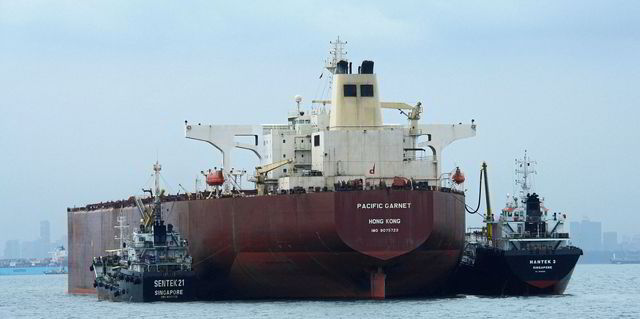 IMO 2020's start sees bunker price spread hit record level
IMO 2020's start sees bunker price spread hit record level
Owners of scrubber-fitted vessels make hay as price of low-sulphur fuel rises to twice that of high-sulphur
The spread between high and low-sulphur fuel oil has surged to a record levels in the days following the implementation of IMO 2020.
The price of very-low-sulphur fuel oil (VLSFO) is trading close to twice the value of conventional high-sulphur fuel oil (HSFO).
That is expected to provide a fillip for stocks of shipping companies with a high number of of scrubber-fitted vessels, which are expected to earn a charter premium.
In Singapore, spot prices for VLSFO have reached $756 per tonne, against an HSFO price of $386, according to Fearnley Securities.
The spread of $370 per tonne is a record high and follows an unrelenting climb in the past three months.
Since mid-2017, the spread has traded in a range of $150 to $250 per tonne, according to data from BIMCO/Marine Bunker Exchange (MABUX).
The spread tanked to a low of $52 per tonne on 17 September 2019, but has steadily risen with the approach and passing of the 1 January deadline for implementation of IMO 2020 rules.
Tight oil markets
The widening spread has been helped by the ongoing tightening in global oil markets, according to Deutsche Bank.
Both the 2020 and 2021 spread hit record high levels yesterday in intra-day trading, closing at $260 and $220 per tonne, respectively.
“Early results indicate that shipowners have been able to hold on to scrubber economics,” the equity analyst said.
Scrubber-fitted VLCCs are earning a charter premium of $20,000 per day, while LR2 product tankers enjoying a $9,000 per day spread on earnings.
Capesize bulkers with the exhaust-gas cleaning systems are able to earn a $10,000 daily premium.
Deutsche Bank singled out Scorpio Tankers and Star Bulk Carriers as likely to manifest “much higher earnings than expected starting in the first quarter of 2020."
But the widening spread also has ramifications in the liner shipping sector amid reports that some operators having difficulties obtaining compliant fuel.
Alphaliner said that some fully loaded containerships have started to gather at anchor while allegedly awaiting VLSFO from their suppliers in order to continue their voyages.
It was unclear whether the affected ships could pursue their voyages after applying for a Fuel Oil Non-Availability Report (FONAR), it said.


